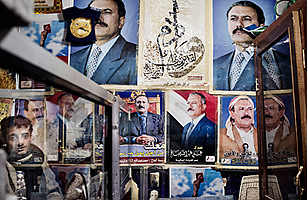
Pictures of President Saleh hang in a shop in the old town of Sana'a
(2 of 3)
Like the Iraqi sheiks, al-Jamili really has little in common with al-Qaeda. He seeks to bring development funds to his native province of al-Jawf, in northern Yemen, and until recently regarded Islamic extremism as a threat. But, just days before we met, al-Jamili had had a change of heart. Only a few days before, AQAP had pulled off a pair of spectacular attacks in northern Yemen. The targets were religious processions by a Shi'ite group known as the Houthis, who have been fighting a six-year rebellion against the Saleh regime and now control large parts of the north. In al-Jawf, those who don't support the Houthi cause face intimidation and extortion. So when suicide bombers killed nearly 60 Houthis, it won AQAP many admirers, including al-Jamili. "I respect al-Qaeda for one reason: they hit the Houthis," he said.
I pointed out that al-Qaeda is unlikely to have much respect for him. As a Shi'ite and head of an NGO that works with Western agencies, al-Jamili is, in jihadist eyes, twice deserving of execution. But he waved off my arguments. "That won't happen here," he said. "Yemen is different."
Unlike the sheik, Ramadan Mohammed, who works for an oil company in southern Yemen, had no illusions about AQAP. "They are people without souls," he told me when we met at a fish market in the ancient port city of Aden. "All they want to do is kill and kill." But he was nonetheless critical of Saleh's recent efforts to crack down on the terrorists. The President, he said, should be concentrating on the demands of southern Yemenis, who were being denied a fair share of jobs and resources. The once separate countries of South Yemen and North Yemen merged amicably in 1990, but the union soured when Saleh's northerners began to monopolize political power and economic opportunity. The President put down an uprising in 1994, but a new separatist movement known as Herak has emerged. In comparison, Mohammed felt, AQAP was a trifling matter: "They are some crazy boys, and we're talking about the problems of men."
A State of Denial
But those "crazy boys" have a history of growing up to pose problems for men. Yemen has long been a recruiting ground for jihadists keen to fight in Bosnia, Iraq, Somalia, Afghanistan and Pakistan. They gained a reputation for being fierce soldiers. Osama bin Laden, whose grandfather was from the eastern region of Hadramaut, was said to favor Yemenis. (More than half the remaining 173 detainees in the Guantánamo Bay detention center are Yemenis.) But since the jihadists represented no threat to Saleh, he did little to stamp them out. Only after al-Qaeda's 2000 bombing of the U.S.S. Cole in Aden harbor did Yemen's authorities begin, fitfully, to move against the jihadists.
More recently, with Western military and intelligence agencies cracking down on al-Qaeda operations elsewhere, Yemen has emerged as a relatively safe haven and base of operations. Which means Yemeni jihadists no longer need to cross deserts and oceans to train and fight; they can wage holy war from home. And the plots against targets in the U.S. and Europe show they're as skilled as terrorist masterminds as they were as soldiers. "In terms of how sophisticated they are with tactics and their ability to execute operations outside their own territory, [AQAP] today is where bin Laden was, say, in 1998," says a U.S. counterterrorism official. That was the year al-Qaeda announced itself to the world by bombing the U.S. embassies in Nairobi and Dar es Salaam, Tanzania.
The U.S. has been pressing Saleh to do more. But a pliant President is only as useful as the extent of his control over the country. Although Saleh's security forces have kept AQAP out of cities like Sana'a and Aden, they have little or no presence in large swaths of Yemen, especially in the east and north, where the jihadists are sheltered by tribal connections. There's no reason to believe Saleh's successor will be able to exert any more authority than he has in these areas.
It doesn't help that many Yemenis, including leading opposition politicians, believe the West is exaggerating the threat from AQAP and especially from al-Awlaki, whose online English-language sermons have no audience in Yemen. "Nobody had even heard about him until the Americans began to talk about him," says Ezzadin Saeed al-Asbahi, a human-rights activist. Still others say AQAP may be a threat to the U.S. but not to Yemen. And some simply accuse Saleh of exploiting U.S. paranoia over al-Qaeda to extract money and munitions. "Al-Qaeda is just a card in the hand" of Saleh, says opposition leader Ansaf Mayo.
Nothing to Show for 32 Years
In Sana'a the threat of AQAP is easy to dismiss. There have been few terrorist attacks there; the city is safer than Islamabad, Kabul or Baghdad. A Westerner can hail a cab in the street and be driven safely from the upscale suburb of Hadda across town to the ancient suqs of the old walled city. Sana'a would be a magnet for American and European tourists, Abubakr al-Qirbi, Yemen's Foreign Minister, tells me, if only the U.S. and European governments would withdraw their alarming travel advisories. At more than 7,200 ft. (2,200 m) above sea level, the city is cooler than most places in the Arab world — and more beautiful.